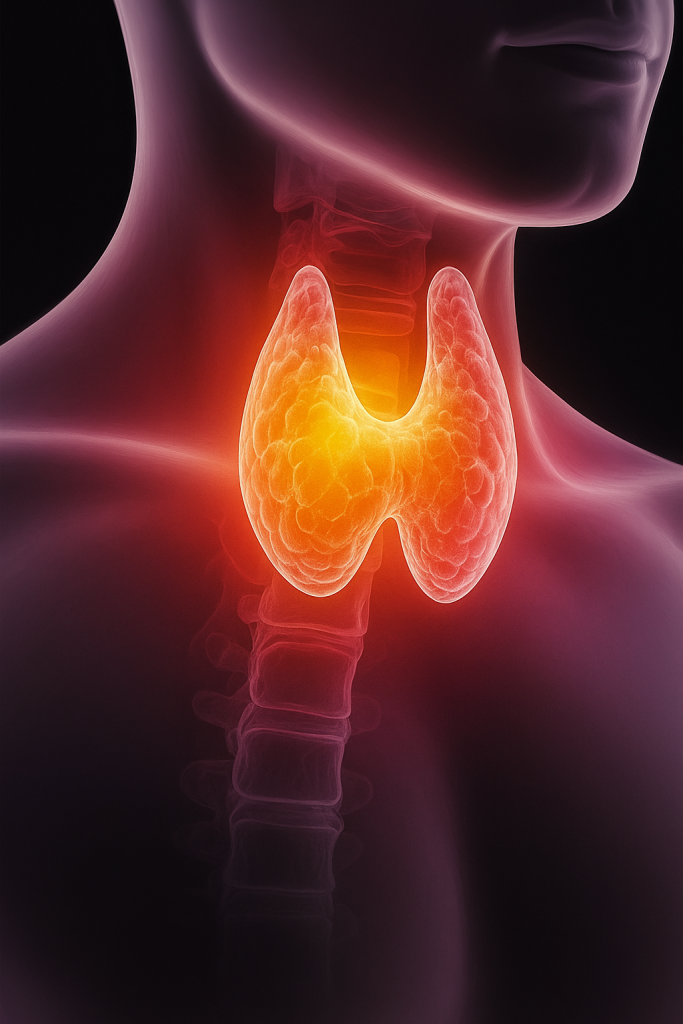
Hypothyroidism is a condition in which the thyroid gland stops producing adequate amounts of thyroid hormones. The thyroid gland is a butterfly-shaped organ located in the front of the neck, just below the Adam’s apple. This important gland produces the crucial hormones thyroxine (T4) and triiodothyronine (T3), which regulate metabolism, influence energy production, affect heart rate, promote cellular growth, and help maintain body temperature. Any disruption in these hormones can lead to a wide variety of health issues.
Symptoms
Symptoms of an underactive thyroid (hypothyroidism) can range from subtle to debilitating. Below is a list of common signs and symptoms:
- Fatigue and mental fogginess
- Sensitivity to cold
- Constipation
- Fluid retention
- Slowed heart rate
- Memory issues
- Muscle weakness and joint pain
- Dry skin, brittle hair, and nails
- Hoarseness
- Depression or mood changes
- Weight gain
- Heart problems or hypertension
- Sleep disturbances
- Elevated cholesterol
- Hair loss
Causes
There are many factors that can lead to an underactive thyroid gland. Women appear to be more prone than men to thyroid disease. In women, hormonal imbalances—especially during menopause—can create stress on the adrenal glands. The adrenal glands are extremely sensitive to changes in hormones, stress, and other influences during this stage of life. This adrenal shift can signal the thyroid gland to slow hormone production.
There is also growing concern in the medical community that an underactive thyroid is easily influenced by environmental pollutants and chemicals. These substances, known as endocrine disruptors, interfere with thyroid function by damaging the gland or blocking hormone signaling. Examples include pesticides, herbicides, heavy metals, bisphenol A (BPA), PCBs, molds, and more. Even mild chemicals—such as chlorine in swimming pools—can act as endocrine disruptors by displacing iodine, which is essential for normal thyroid function.
Endocrine disruptors are found in countless commercial products, including cosmetics (facial creams, deodorants, perfumes, shampoos, hand sanitizers, etc.), as well as household goods like plastics, cookware, paint, and furniture. They can even contaminate our food through molds, preservatives, pesticides, and hormones.
The thyroid gland is extremely delicate and particularly susceptible to chemical interference. These chemicals may bind to the gland and block signals to produce hormones, or directly damage thyroid tissue—especially with continuous exposure. In modern life, it’s nearly impossible to avoid daily contact with toxins and endocrine disruptors.
A Realistic Scenario
Consider this typical day:
You wake up and get dressed in clothing made from petrochemicals, walk across new carpet coated with PFAs, and breathe in paint fumes containing heavy metals in your recently renovated home. You shower using a body wash full of phthalates, then apply chemical deodorant, perfume, hairspray, and gel.
Feeling good, you make a fresh cup of coffee—possibly containing mold—brewed through a dioxin-bleached filter. On the way to work, you snack on a breakfast bar wrapped in plastic lined with toxic chemicals, inside your new car with that “new car smell” that’s actually off-gassing volatile toxins.
Throughout the day, you eat food cooked in Teflon-coated pans, served with plastic utensils and containers made from BPA and petrochemicals.
After work, you wash clothes with detergent full of dyes, fragrances, and synthetic additives. Dinner may include sourdough bread with preservatives, stabilizers, and herbicides, and a steak containing hormones, antibiotics, and other chemicals from feed and groundwater.
Even some natural foods can act as endocrine disruptors. For example, soy and soy-based products (including tofu) may affect thyroid function. Similarly, naturally occurring molds and heavy metals in groundwater can also disrupt thyroid hormone production.
It’s “scary” to realize just how many environmental pollutants, chemicals, molds, and toxins enter our daily lives—and how much our thyroid glands (and other organs) suffer because of it.
How to Limit Exposure to Endocrine Disruptors
- Choose organic fruits, vegetables, meats, eggs, and dairy
- Read ingredient labels on all prepared foods and drinks—choose minimally processed options
- Buy natural or organic cosmetics
- Use glass for cooking, serving, and storage
- Avoid Teflon or non-stick cookware
- Limit or eliminate plastics where possible
- Filter your water
- Exercise, sweat, and use saunas to help detoxify
- Shower after swimming in chlorinated pools
- Consider a shower or whole-home water filter
- Avoid storing or heating food in plastic containers
- Wash all fruits and vegetables thoroughly
- Remove mold from your home
- Consider environmental pollutant and mold testing to identify and reduce exposure
Testing for Thyroid Disease
Diagnosis and treatment for hypothyroidism typically begin with bloodwork ordered by your physician. The following markers are commonly used to assess thyroid function:
- TSH (Thyroid Stimulating Hormone): Produced by the pituitary gland to signal the thyroid to release hormones. High TSH suggests hypothyroidism; low TSH indicates hyperthyroidism.
- T4: The inactive thyroid hormone.
- T3: The active thyroid hormone.
- Reverse T3: Helps identify thyroid dysfunction when other values appear normal but symptoms persist.
- TPO (Thyroid Peroxidase Antibodies): Immune proteins that target thyroid enzymes. Elevated TPO levels indicate autoimmune conditions such as Hashimoto’s disease, in which the body attacks its own thyroid gland.
Treatment
Treatment for thyroid disease is complex and requires a thorough evaluation, including bloodwork and possibly tests for environmental pollutants, heavy metals, mold, and cortisol levels to identify root causes and guide detoxification strategies.
Additional treatment options may include:
- Nutritional supplementation, such as iodine or other key nutrients
- Adrenal support or treatment for underlying adrenal dysfunction
- Autoimmune management (e.g., Hashimoto’s disease) through diet, nutrition, sleep, stress reduction, and exercise
- Thyroid hormone replacement therapy, which may include conventional medications like levothyroxine or natural alternatives such as porcine desiccated thyroid or custom-compounded formulations
